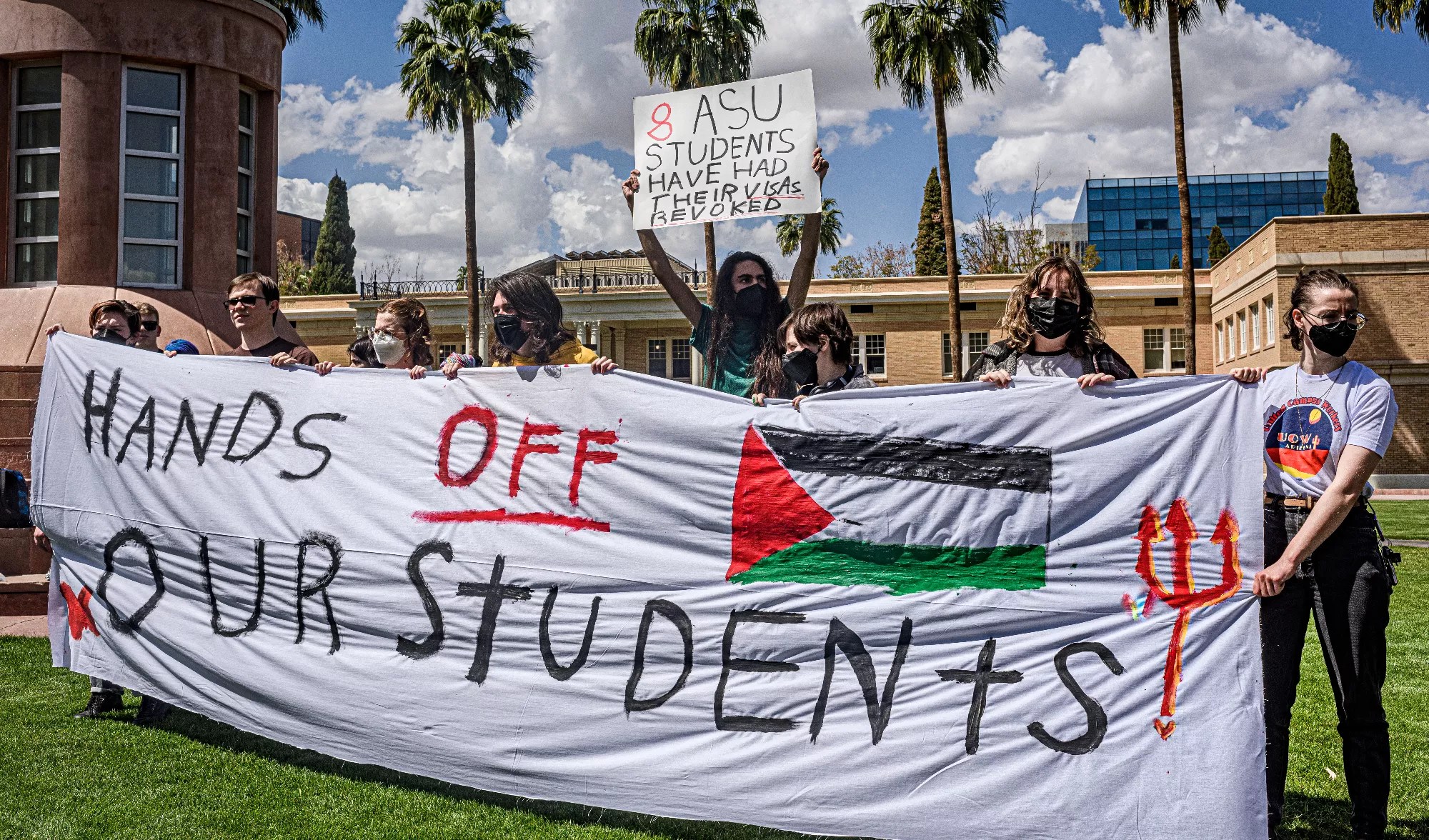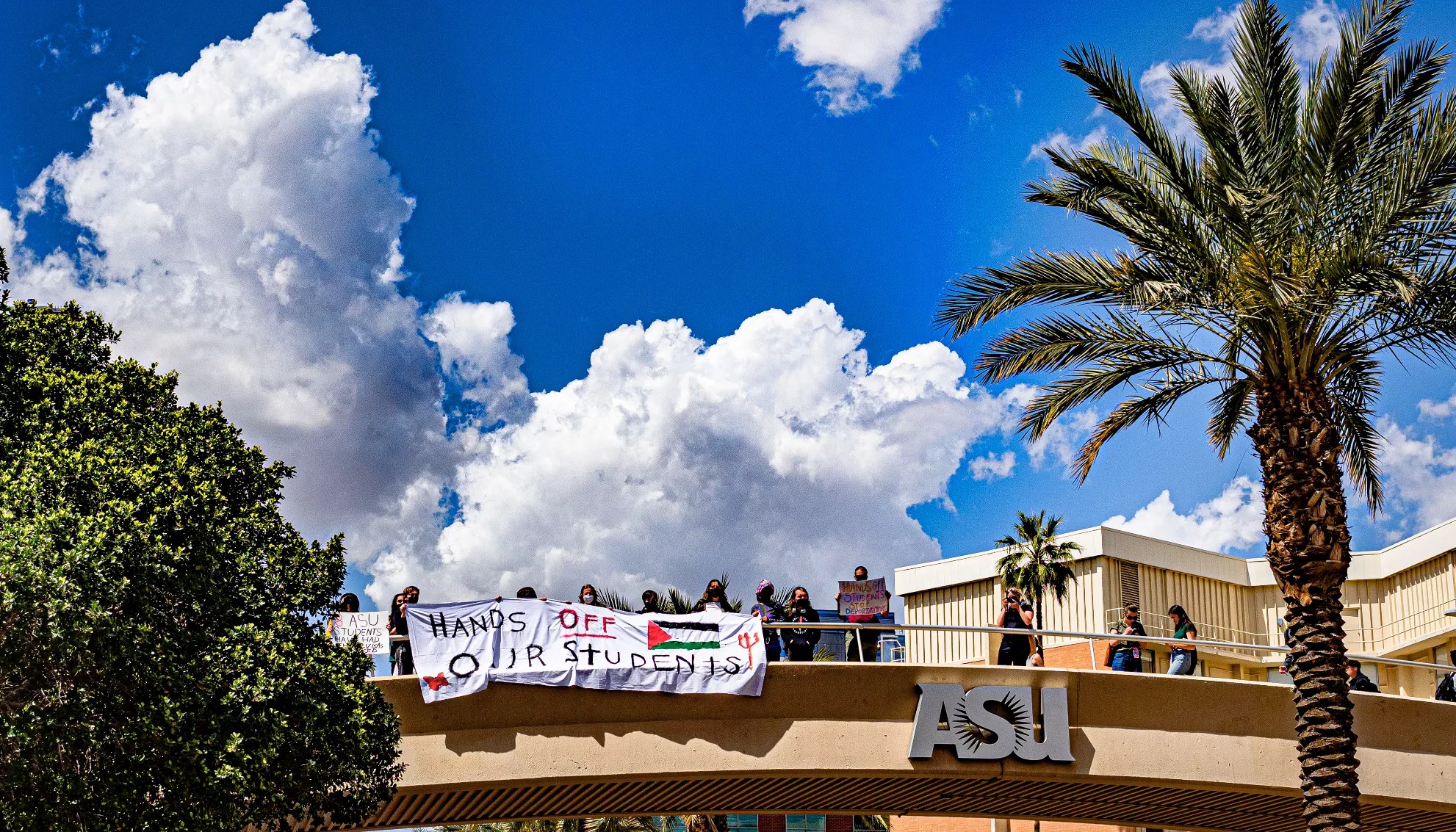
Kevin Hurley

Audio By Carbonatix
If you have information to share about this story or any other immigration enforcement activities – on the record or off – you can reach the reporter at morgan.fischer@newtimes.com or on Signal at 623-295-9472.
***
Thursday afternoon in Tempe, a handful of Arizona State University students gathered around a large white sheet laid out on the green grass of Hayden Lawn. All members of the group Students for Justice in Palestine at ASU, squeezed paint onto paper plates and began painting a banner before walking it through campus and hanging it over a pedestrian bridge.
“HANDS OFF OUR STUDENTS,” it read.
A day earlier, AZ Luminaria reported that the U.S. State Department had revoked the visas of eight international students at ASU. The news came amid a months-long crackdown on immigrants under President Donald Trump, during which immigration authorities have yanked visas and detained and deported immigrants with specious justifications.
Some have been detained over spurious connections to the Venezuelan gang Tren de Aragua. Others – including many university students – have found themselves arrested by U.S. Immigration and Customs Enforcement over criticism of Israel’s war in Gaza.
SJP had already been planning a Thursday protest when the AZ Luminaria’s report dropped. It quickly shifted its focus to call attention to the paranoia and fear percolating throughout ASU’s campus.
“It’s not a safe space on campus for students,” said SPJ co-chair Sophie Levitt, a 22-year-old senior majoring in justice studies. “That’s what the ASU charter itself proclaims ASU was supposed to be. It goes against its very own mission, essentially, when it’s creating this unsafe environment for its students.”
The school’s 46-word charter, written on slabs of granite placed throughout the university’s four campuses, reads in part: “ASU is a comprehensive public research university, measured not by whom it excludes, but by whom it includes.”
ASU has acknowledged the visa revocations but has given few details about the students affected. In a statement to New Times, ASU spokesperson Jerry Gonzales stated that “federal authorities have revoked visas for at least eight students,” but that ASU couldn’t provide an exact number “due to the complexity of the visa process.”
Gonzales said that the revocations “are unrelated to campus protests” and “stem from what appear to be, in most cases, various legal infractions.” In a statement to AZ Luminaria, ASU asserted that none of the eight foreign students to lose visas are from Latin American countries. That explanation doesn’t go far for SJP members.
“We can’t trust them,” said 20-year-old Mikhaila, who asked that her last name be withheld. “They’ve made it very clear that we can’t trust them, and they’re not on our side.”
“They are not giving us clear answers,” Levitt added.

SJP students hang the banner over a foot bridge.
Kevin Hurley
Highly unusual
Whatever the reason for pulling the students’ visas, immigration attorneys and advocates in Arizona say doing so is highly unusual.
Immigration lawyer Salvador Macias of Nuñez Law Group said he’s “not once” dealt with or heard of an individual who had their student visa revoked – at least not before Trump took office for the second earlier this year. Francisco Aguirre, the founder and CEO of Beyond Attorneys, said the same.
“I have never heard of a student visa being revoked,” Aguirre said.
Visas are typically revoked if the holder violates its terms in some way, Macias said. For students, this could mean they started working in an area outside of their field or that they committed a serious crime. More recently under Trump, it’s meant that an international student expressed an opinion that the current administration doesn’t like.
In what Macias called an “unprecedented step,” Secretary of State Marco Rubio has directed the department to look into anyone who has a visa to find a pretext for deporting them. “If you think that they performed an act that we now classify as terrorism or against the interest of the United States, we will start revoking it,” Macias said. If visa-holders protested against the war in Gaza, posted something on social media or even just shared an op-ed or news article online that’s not in line with the administration’s, they could lose their visas.
“The administration is not batting an eye in terms of revoking on something as little as even their social media accounts,” Marcias said.
If this smells funky to you, you’re not alone. The Trump administration has been detaining and deporting people by citing fishy authority, including that having tattoos and being Venezuelan is enough to identify a person as a member of Tren de Aragua. Additionally, the Trump administration has cited the Alien Enemies Act of 1798 – which allows for the immediate removal of foreign nationals during wartime – to deport alleged Latin American gang members that the administration claims have “invaded” the United States.
Many people deported under that law have been shipped to an infamously brutal prison in El Salvador, where they have been unable to speak with their families or contest their arrests. Federal courts have nonetheless ruled against the administration’s practices, halting deportation flights to El Salvador and barring immigration authorities from detaining specific people, but courts move slowly and immigrant communities are still fearful.
“This administration is coming up with very creative ways to remove individuals,” Macias said, adding that it’s happening “so quickly and so erratically without deep legal research” that ICE officers “don’t know why they’re doing what they’re doing.”
ICE has not been present on ASU’s campus, according to the University, although the school previously told the Arizona Republic the opposite. ASU walked back that statement, which Gonzales said “was based on some rumors that later proved to not be true.”
Still, Levitt and others with SJP are acutely aware that university administration or the cameras on top of Hayden Library are watching them and other students. They are all American citizens and should have little to fear from ICE. (Though immigration authorities have ensnared citizens in their sweeps already.) They’ve been careful to protect members of the student population whose presence in the country is more tenuous, especially now.
“I have a certain privilege being a resident here in Arizona, being a citizen,” said Levitt. “I feel a bit more comfortable pushing the boundaries. But I know that so many people are unable to do the same thing because if they do, they’re risking deportation, they’re risking their visa being revoked.”